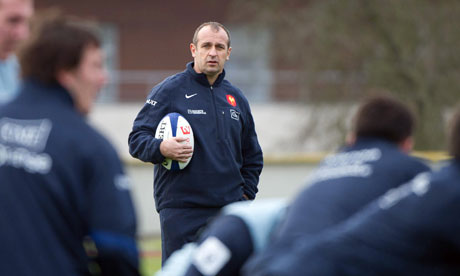
French rugby, for all its faults, has long been revered around the world as the embodiment of a romantic ideal. One flash of genius from the hands of a Frenchman is enough for the rest of us to forgive and forget any amount of dysfunction or brutality.
Perhaps not surprisingly, in France it is the faults that preoccupy, and when Thierry Dusautoir, their shining example of a captain, became the latest Frenchman to muse over that "Anglo-Saxon" virtue of consistency. Consistently good or consistently bad, it is almost as if the French just want to be able to know what to expect of themselves for once.
It may not be a coincidence, then, that the task of coaxing something reliable from them has now been assigned to Philippe Saint-André, a Frenchman who knows his English culture, having spent 11 years as a player then coach at Gloucester and Sale, two places steeped in the ways of the Anglo-Saxon. France's World Cup last year might have been remarkable for the highs and lows it reached, had it not mirrored their performance at almost every World Cup there has ever been. After the wild eccentricities of the recent regimes of Bernard Laporte and Marc Lièvremont, Saint-André is no doubt seen as a safe bet.
Not that anyone could accuse him of being boring, it is just that he is not one for being difficult or trying to be too clever. In short, he is immensely likeable. Certainly, there seems to be a lightening of mood. After the brooding Lièvremont, Saint-André is encouraging an openness between him and the squad and between the squad and the outside world. In light of the notorious breakdown in relations between Lièvremont and the players, Dusautoir's observations on the first few days of the Saint-André era are poignant.
"He talks a lot with the players," he says. "I think it's one of his priorities – to have a good relationship with the squad and to ensure communication is clear."
In his dealings with anyone, Saint-André is a breath of fresh air. His emphasis on clarity of communication comes despite, in English, an accent that is so extravagantly French you would think it was put on, yet both of his famously earthy clubs in England not only responded with great success to his promptings but fell hopelessly in love with the man. They played great rugby, too, never more so than in the 2005-06 season, when Sale broke the hegemony of Wasps and Leicester to win the Premiership.
When asked, rather awkwardly, whether he intended to mix the best of English attributes with French, er, flair, he roars with laughter. "French craziness, you mean! I can read it in your mind."
But he tackles the subject head on. "What is very important," he says, "is that we put some rules together on the pitch, to be very clear and try to be a little more consistent. We know that for 100 years French rugby has been up and down. At the moment everything is good – we haven't lost any games. But we haven't played any either. In French rugby the expectation is huge all the time. We just have to try to be as pragmatic as possible and to perform well against Italy in the first game, which is like revenge, also, because Italy beat us last year."
His job is not easy, even if France go into this competition as favourites, the heroics of the World Cup final fresh in the memory. Only slightly less fresh should be some of the other headlines from their campaign – unconvincing wins over Japan and Canada, a proper hiding from New Zealand in the pool stages, a shock defeat to Tonga, before a 20-minute purple patch did for England in the quarters to set up a semi-final in which they laboured to beat 14-man Wales. And, as if that were not enough to be getting on with, the players continue to be pulled from pillar to post by the competing demands of club and country.
"I'm nervous," Saint-André confesses, "just because I hear how the other countries have two weeks' preparation, minimum, but our players go back with their clubs over the weekend for a big league game. It's quite tough, because I have had the habit for 12 years to be 11-and-a-half months with the players; now I will be 10 weeks a year with them. So it's a completely different job.
"But it's hard for the players, too. In three weeks they have to play the Heineken Cup one week, the French league this and the Six Nations next. Three weeks, three different competitions. It's not easy to switch from one to the other."
All the more reason, then, for PSA to keep things simple. His predecessor took the idea of experimentation to new degrees in his first few games in charge and kept that spirit going until the end, Lièvremont's selection for that semi-final against Wales representing the first unchanged lineup in his four-year tenure. Saint-André, though, has picked a squad drawing heavily from the World Cup. He seems set to respect the conclusion it took Lièvremont all those years to arrive at.
"I will not experiment. For me the best players must play for the French team. You need to deserve it. If you want to be consistent it is important to keep the same squad as far as possible."
Sensible. Almost Anglo-Saxonly so. But then this is also the man who, among other feats as a player, launched the famous "Try from the End of the World" that helped France claim a series win over the All Blacks in New Zealand in 1994. If he can marry the two spirits, France may finally become what they have always wished they could be – reliable geniuses.

